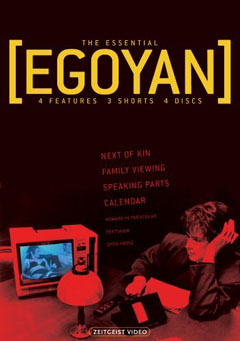

Reviews of Recent Independent, Foreign, & Documentary Films in Theaters and DVD/Home Video
NEXT OF KIN 1984. Country of Origin: Canada. Language: English. 72 min. Not Rated. With: Patrick Tierney, Arsinée Khanjian, Berge Fazlian, Sirvart Fazlian, Margaret Loveys & Thomas Tierney. DVD Features: Director's commentary. Behind-the-scenes rehearsals. Photo gallery. Director bio/filmography. English subtitles.
FAMILY VIEWING
SPEAKING PARTS
CALENDAR
With consistently strong dramatic tension, director Atom Egoyan’s early scripts, lucid and complex, should be the envy of screenwriters and playwrights.
Next of Kin is an exceptional first film: strong writing, acting and camera work, made for only 20,000 Canadian dollars in 15 days. Shooting conspiratorial glances towards the camera, white bread Peter (Patrick Tierney) passes himself off as the long-lost son of an Armenian couple, the Deryans, who unquestioningly welcome him back into the family fold. Peter confides to his new sister, who’s in on his charade, that he’s like an actor, speaking the truth but only in someone else’s voice. If the characters posture, it’s only because the film is about posturing.
Once Peter joins the Deryan family, Kin becomes particularly intimate because of the close-up, hand-held camera, even though in his commentary Egoyan derides this as a failure. He intended the cinematography to have an ethereal effect, as if it were the point of view of the spirit of the missing son. Egoyan is correct; it’s a conceit that doesn’t take hold in the viewer, but is dramatically effective nevertheless.
In Family Viewing, family memories are literally erased when home movies are taped over by homemade pornography. Released in 1987 at the beginning of the digital age, it is remarkably ahead of its time, before anyone and everyone could make a movie. A mute and ailing grandmother is the only remaining living link to the past for cherub-faced Van (Aidan Tierney), a young man named for the former Armenian stronghold. He is her sole visitor in the run-down and ethically-challenged nursing home where she has been cast aside by Van’s father (coolly sinister David Hemblen).
More so than in the other films, images bombard the viewer, a desensitizing hodgepodge of nature documentaries, surveillance videos, home movies, and sex tapes (nearly 20 years before Michael Haneke’s Caché played similar tricks with the audience’s point of view). And David Lynch's Blue Velvet comes close to Viewing’s horrifically detached sex scene. Even when self-conscious performances slacken the pace, the clarity in Egoyan’s writing is actor-proof.
The equally technologically prescient Speaking Parts opens with Clara (Gabrielle Rose) mourning at a mausoleum-cum-private screening room, watching home videos of her handsome brother. Finding her dead brother’s doppelganger in hotel cleaner Lance (Michael McManus), she asks him to audition for the part of her brother in a film she wrote. A struggling actor, Lance has only been an extra so far. All of his work, no matter how fleeting, is cherished by his co-worker Lisa, who has rented all of his movies. Though he doesn’t ever speak to her, she follows him around, leaving roses in a dryer for him to discover.
As the delusional Lisa, Arsinée Khanjian’s blankness is an asset, but her acting remains the same as Lisa goes off the deep end. In this – the most morose offering – the lead actors drift in and out of scenes at the same pace. The momentum peters out as both Clara and Lisa crack up and Lance gets his big break. Of all four films, this plot is the most forced. And in order to look more like Clara’s brother, McManus wears a most distracting wig.
By contrast, Calendar is a breath of fresh air. The ramifications of the Armenian Diaspora are never far away in Egoyan’s work, and here Armenia’s rugged terrain and ancient churches almost upstage this convincing drama starring Egoyan as a photographer and Khanjian, at her most relaxed, as his wife/interpreter in an imploding relationship. As he shoots his scenic calendar project, he is frozen out of her exchanges with their attractive Armenian guide. Alienated, he’s like a viewer watching a foreign language film without subtitles, until it becomes painfully apparent what has been developing before his viewfinder. The interactions feel light and improvised, yet the screenplay is well structured. Interwoven within the road trip are Egoyan’s hapless and dour attempts in dating an internationally eclectic group of women, all of Armenian background, a year later. The romantic futility suggests an even more downtrodden Woody Allen.
Available together for the first time, this four-disc set is an eye opener for viewers only familiar with Egoyan’s later films (The Sweet Hereafter, Felicia’s Journey and Where the Truth Lies), many of which were adapted from novels and could not showcase the director’s full talents as a storyteller. Among these films, Next of Kin is perhaps the most engaging of the collection, thanks to Berge and Sirvart Fazlian as Peter’s new substitute parents. Their gregarious performances are larger than life and uninhibited, unlike the detached and understated Khanjian as their prodigal daughter, or for that matter generally the casts of the two remaining films. Though the films are reason enough to invest in the collection, Egoyan’s commentaries are a boon for a fan or film student. He rightly compares his commentaries to film school, explaining how he captured certain shots and what scenes were shot on the fly. His comments are an excellent example of dramaturgy, doubtlessly informative.
Kent Turner
|